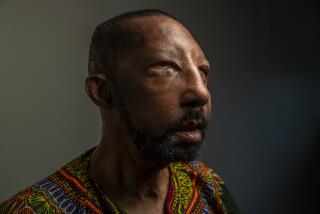Life, Death and ‘Sweetness’
- Share via
In the end, doctors say, a liver transplant would not have saved former football star Walter Payton.
Nevertheless, the impact of his announcement months earlier that he was seeking a liver transplant has had a positive effect.
It put a familiar and beloved face on a continuing crisis, the shortage of available organs for those who need transplants.
More than 66,000 patients are waiting for a donor organ, experts say. About 5,500 organ donations were made last year, but 4,300 people died while waiting for a transplant.
It was heartbreaking to watch Payton admit that he was “scared” and to see him burst into tears while announcing to the world that he had been put on the waiting list for a liver transplant.
It was particularly heartbreaking for those of us who cheered Payton’s glory days as one of the greatest running backs in football history, especially in 1986 when he helped take the Chicago Bears to their only Super Bowl championship.
Remembering the heartbreak in my own family when my mother died of kidney failure, I silently hoped and prayed that Payton’s family would not have to go through that. I am certain that I was not the only onlooker who hoped for a Hollywood miracle, the last-minute appearance of a liver from some thoughtful donor who would save the day.
It was not to be. Payton died Monday without a transplant. He had been taken off the waiting list when the doctors discovered that his condition had worsened into liver cancer. In that condition, experts say, the anti-rejection drugs needed to help him keep the new liver would have weakened his immune system and hastened the spread of the cancer.
Nevertheless, Jack Lynch, who heads community relations for the Regional Organ Bank of Illinois, told me that another miracle of sorts occurred: Organ donations took a sharp upturn after Payton’s press conference.
“Up until that point, organ donations had dipped very low,” Lynch said. “Since that time, our rates in Illinois are in a banner year, and nationally we are up about 5%. I attribute that to Walter.”
The organ donation gap is particularly acute for those who are, like Payton, Lynch and me, of African descent. In a sad paradox, black Americans require organ transplants at a much higher rate than white Americans do, yet have a much lower participation rate in donation programs.
African Americans need 30% to 35% of the organs donated, according to transplant experts. Yet we make up only 14% of donors compared to white Americans, who make up close to 76% of donors.
As a result, most black recipients receive organs from someone of another race, which does not help the odds of acceptance by the new host body.
African Americans give a number of reasons for our lower participation rate.
Some cite religion. More of us are simply paranoid. Many of us just want to leave the world with everything we came in with. Since the notorious Tuskegee experiments, in which a federal program used black men as guinea pigs in a syphilis study earlier this century, many blacks are suspicious of any unusual medical procedures.
Now a new batch of surveys shows that the leading factor in determining whether you will consent to donate your own organs or those of a loved one may be how you feel about the way you have been treated by the health care system.
African Americans, for a variety of historical reasons, have more complaints about how doctors, nurses or hospitals have treated them.
If they believe that they have been treated badly, refusal to donate may be their way of striking back at the system, especially if they think doctors or nurses are being nice just to get their organs.
Attitudes count, according to a new national survey unveiled in an organ-donor research conference in Cleveland earlier this week. Nurses were found to be more successful than doctors in persuading families to donate, for example, perhaps because nurses tend to be less rushed and more empathetic at this highly sensitive moment.
Shortly after his news conference, Payton met privately with Lynch and others at the Illinois organ bank. Payton wanted to know about his chances for survival, Lynch recalled, but “he was more concerned about whether his going public would have a positive effect on the donation process.”
It already has. Just as baseball star Mickey Mantle brought badly needed attention to transplants and the ethics associated with them, I hope Payton’s ordeal will help minorities, in particular, to make informed and rational choices.
If so, it could be the sweetest gift that “Sweetness” has left behind.
More to Read
Go beyond the scoreboard
Get the latest on L.A.'s teams in the daily Sports Report newsletter.
You may occasionally receive promotional content from the Los Angeles Times.










